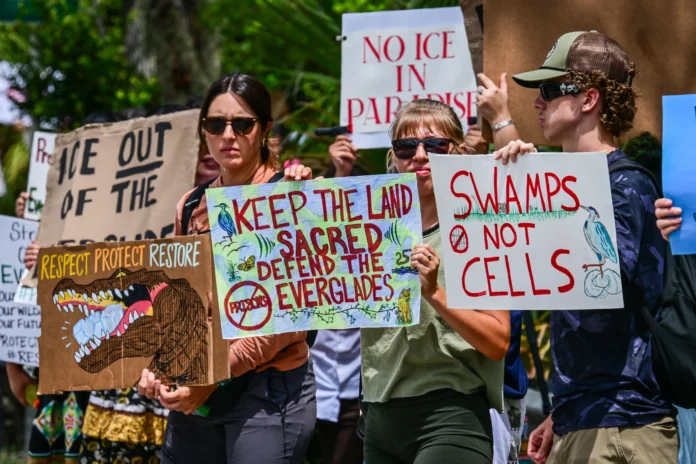A federal judge ordered the dismantling of the immigration detention center known as “Alligator Alcatraz” within 60 days, and also barred the entry of new migrants, after considering a lawsuit from environmental groups.
Judge Kathleen Williams of the Southern District of Florida ruled partially in favor of environmental groups Friends of the Everglades and the Center for Biological Diversity, as well as the Miccosukee Tribe, who demanded the complete and immediate closure of the facility due to its damage to the Everglades wilderness, DW reported.
The order prohibits the installation of any additional infrastructure such as tents, dormitories, buildings, or offices, as well as the paving, excavation, or fencing of the site, which opened on July 3 at an airport that was abandoned after a visit by US President Donald Trump.
It also prohibits “bringing any additional persons to the site who were not already detained there at the time of the order,” although it does not prohibit modifying or repairing existing infrastructure.
After 60 days, authorities must remove the fence to allow passage to the Miccosukee Tribe, an indigenous people who belong to the area, remove the industrial lighting from the site, and remove the gas, sewage, and waste installations from the project promoted by Florida Governor Ron DeSantis, a Republican.
This lawsuit seeks to stop the detention center, which currently has a capacity of 2,000 people and was expected to grow to 4,000, according to the Florida Division of Emergency Management (DEM), for environmental reasons. It is being built in a natural area with 36 endangered endemic species such as panthers, wood storks, alligators, and crocodiles.
“This is a landmark victory for the Everglades and countless Americans who believe endangered species should be protected, not exploited,” said Eve Samples, executive director of Friends of the Everglades, in a statement.
“Alligator Alcatraz” has been mired in controversy from the beginning. Lawmakers who toured the site described hundreds of immigrants confined in cages under sweltering heat, insect infestations, and meager meals, CNN reported.
Questions have also persisted about who is in charge of the center, whether it is the federal government or the state of Florida.
Florida claims to operate the temporary detention camp under agreements between state and local agencies and U.S. Immigration and Customs Enforcement (ICE). But when it comes to day-to-day operations at the facility and decisions about who is detained there, federal officials have said the state is in charge.
Critics argue that the lack of clarity about ultimate responsibility for the facility raises concerns about accountability and oversight.
The detention center is located just over an hour’s drive west of Miami. During a visit to the facility before its opening, Florida Governor Ron DeSantis emphasized that the facility was both “temporary” and “necessary” to ease the burden on the state’s law enforcement agencies and prisons, which he said were experiencing a surge in immigrants.






